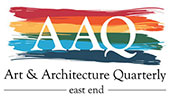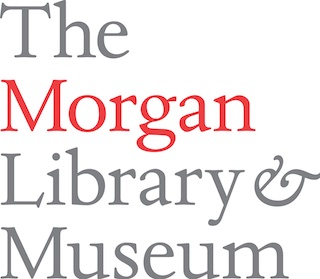
~~~~~~~~~~~~~~~~~
The Morgan Celebrates the Democratic Spirit of Walt Whitman’s
Poetry and Life in an Exhibition This Summer
Walt Whitman: Bard of Democracy
June 7 to September 15, 2019
~~~~~~~~~~
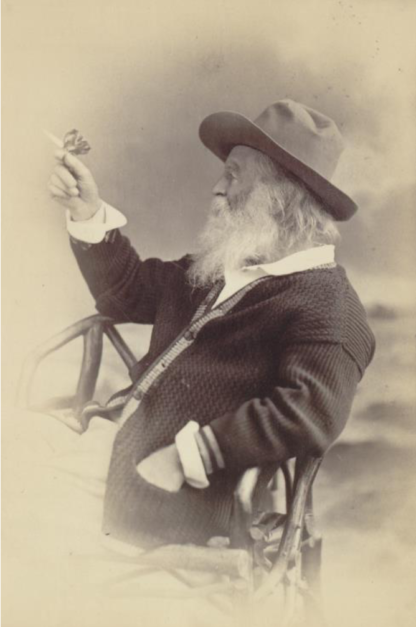
Phillips & Taylor, Photograph of Walt Whitman, 1873. Prints and Photographs Division, Library of Congress.
————————–
In celebration of the two hundredth anniversary of Walt Whitman’s birth, the Morgan Library & Museum exhibits the work of the beloved American poet. In a notebook in 1859, Whitman wrote, “Comrades! I am the bard of Democracy,” and over his 73 years (1819–1892) he made good on that claim. As he bore witness to the rise of New York City, the Civil War and other major transformations in American life, Whitman tried to reconcile the famous contradictions of this country through his inclusivity and his prolific body of work. The author of one of the most celebrated texts of American literature—Leaves of Grass (1855)—came from humble origins in Long Island and Brooklyn but eventually earned a global audience that has never stopped growing. Walt Whitman: Bard of Democracy traces the development of his writing and influence, from his early days producing local journalism and sensational fiction to his later years writing the visionary poems that would revitalize American letters.
Drawing on the Morgan’s own holdings as well as exceptional loans from the Library of Congress, the exhibition shows the landmarks of his literary career, including “O Captain! My Captain!” and the famous letter written to Whitman by Ralph Waldo Emerson commending Leaves of Grass. A notebook containing Whitman’s early experiments with free verse and the origins of the seminal poem “Song of Myself” will be on display, as well as the copy of Leaves of Grass that Whitman presented to the artist who engraved his emblematic portrait in the first edition. Also on view are documents by famous writers influenced by Whitman, such as Oscar Wilde, Hart Crane, Federico García Lorca, Langston Hughes, and Allen Ginsberg.
Whitman’s broad-minded positions on social issues of his day made him a symbol for progressive political and civil rights movements in modern times. The uninhibited sensuality of his poetry and his pioneering contributions to gay literature have been an inspiration to the LGBTQ community as well.
Early in his writing career, Whitman wrote temperance novels and stories of walking around the city, exploring its nooks and crannies. The exhibition presents some of these fugitive publications from New York’s literary underground.
——————-
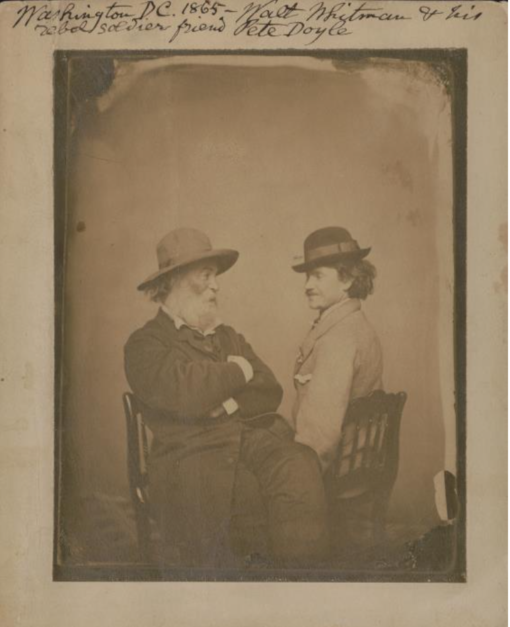
Moses P. Rice and Sons?, Walt Whitman and his rebel soldier friend Pete Doyle,
1865, photograph; albumen print on card mount.
Library of Congress Prints and Photographs Division.
Whitman saw himself foremost as a New Yorker: he claimed that many of his poems “arose out of my life in Brooklyn and New York from 1838 to 1853, absorbing a million people, for fifteen years, with an intimacy, an eagerness, and an abandon, probably never equaled.” In the early 1850s, Whitman began writing free verse poetry and self-published Leaves of Grass in 1855. The book celebrated the first person in a way that no poetry ever had before. A portion of the exhibition examines all of the circumstances of this act of self-invention.
The show also explores his attention to the great drama of his time, the Civil War, and Whitman’s emotional bond with Abraham Lincoln. After the war, Whitman’s writing attracted a greater number of friends and visitors, including a number of gay readers and writers who saw him as a liberator and a model for their own path-breaking work. Whitman’s relationship with former Confederate soldier and streetcar conductor Peter Doyle will be another focus of the exhibition, featuring the famous photograph of the two of them together.
Even after Whitman reached the end of the road in 1892, he continued to inspire others. A final section in Walt Whitman: Bard of Democracy is devoted to his enduring global influence in the twentieth century and beyond.
In addition, the show has a strong visual element, incorporating photographs by Matthew Brady and others, significant nineteenth-century paintings, prints, and engravings, among them a depiction of a Civil War battle by Winslow Homer, paintings and drawings by Joseph Stella, Rockwell Kent, and David Hockney, twentieth and twenty-first-century artists’ books, and ephemera.
“Walt Whitman’s poetry occupies a special place in American literature,” said Colin B. Bailey, director of the Morgan Library and Museum. “He was a New Yorker in that he not only captured the spirit of his bustling, complex, and contradictory city, but he also carved out a career path for himself through his ambition and surprisingly proactive self-promotion. We are excited to offer more insight into his inspirations, his world, and the evolution of his dynamic voice.”
“It was a joy to work with the Morgan on this comprehensive exhibit, and to see New York City all over again, through his eyes,” said Ted Widmer, guest curator and Distinguished Lecturer at the Macaulay Honors College of the City University of New York. “It never stops moving and neither did he.”
Widmer is also author of Young America: The Flowering of Democracy in New York City and many other works of history. The exhibition opens June 7 and runs through September 15.
—————————–
Public Programs
CONCERT
Whitman in Music and Words
Matthew Aucoin, Ben Lerner, and John Moore
In conjunction with the exhibition Walt Whitman: Bard of Democracy, composer and conductor Matthew Aucoin curates an evening of spoken word and music featuring Walt Whitman’s letters and poems with musical excerpts from Aucoin’s 2015 opera Crossing and works by John Adams and Leonard Bernstein. Featuring Matthew Aucoin, piano, John Moore, baritone, and Ben Lerner, poet/writer. Aucoin is a 2018 MacArthur Fellow.
Thursday, June 20, 7:30 PM*
————————
LECTURE
Tickets: $35; $25 for members.
*The exhibition Walt Whitman: Bard of Democracy at 200 will be open at 6:30 pm for concert attendees.
—–
Walt Whitman’s World
David S. Reynolds & Zachary Turpin
Explore the influences of nineteenth-century America on Walt Whitman’s writing, from slavery and his witness of the Civil War to everyday life in New York City with David S. Reynolds, Distinguished Professor, The Graduate Center of the City University of New York, and author of Walt Whitman’s America: A Cultural Biography, and Zachary Turpin, Assistant Professor, University of Idaho, and author of the forthcoming book, Lost. Questions will be moderated by Ted Widmer, Distinguished Lecturer, Macaulay Honors College, CUNY and guest curator of Walt Whitman: Bard of Democracy.
Wednesday, June 26, 6:30 PM*
Tickets: $15: $10 for Morgan Members, free for students with a valid ID.
*The exhibition Walt Whitman: Bard of Democracy at 200 will be open at 6:30 pm for concert attendees.
—–
LGBTQ & Friends: We Contain Multitudes
Inspired by queer icon Walt Whitman’s famous words “I contain multitudes” (Song of Myself, 1855), our second-annual LGBTQ & Friends party celebrates the multiplicity of personal identity, as well as the true diversity of the LGBTQ+ community. Enjoy live music, curator talks, a wine bar, afterhours access to our exhibitions, as well as special spoken word performances in J. Pierpont Morgan’s Library.
This evening event is held conjunction with World Pride Week, the 50th anniversary of the Stonewall uprising, and the exhibition Walt Whitman: Bard of Democracy.
Thursday, June 19, 7–9 PM*
Tickets: $30; $25 Morgan Members
V.I.P. Tickets: $75; $50 Morgan Members (includes early access to exhibitions at 6 PM and a toast with the director).
—–
Poets Of the Soul: Susan Howe and Shane McCrae
In conjunction with the Morgan’s exhibition Walt Whitman: Bard of Democracy award winning poets and authors Susan Howe (My Emily Dickinson, The Birth-mark, and Debths, among others) and Shane McCrae (Mule, In the Language of My Captor, and The Gilded Auction Block) will read their favorite Whitman poems as well as some of their own, reflecting on his poetic legacy and influence on their practice. Cosponsored by the Morgan and Poetry Society of American.
Thursday, July 11, 6:30 PM*
Tickets: $15: $10 for Morgan and Poetry Society Members. Seating is limited. *The exhibition Walt Whitman: Bard of Democracy will be open at 5:30 pm for program attendees.
—–
Walt Whitman: Bard of Democracy
Ted Widmer, Distinguished Lecturer, Macaulay Honors College, CUNY
Friday, June 14, 6 pm Friday, July 26, 1 pm
————————
Walt Whitman: Bard of Democracy is organized by the Morgan Library & Museum. The curator of this exhibition is Ted Widmer, Distinguished Lecturer at the Macaulay Honors College of the City University of New York, author of Young America: The Flowering of Democracy in New York City, and many other works of history.

~~~~~~~~~~~~~~~~~~~~~~~~~~~~
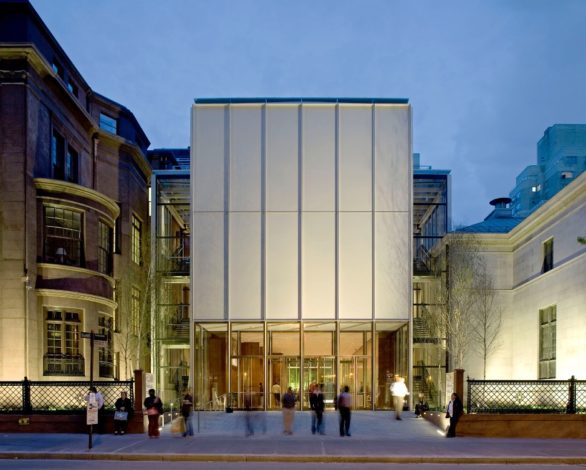
Madison Avenue entrance to the Morgan Library & Museum.
A museum and independent research library located in the heart of New York City, the Morgan Library & Museum began as the personal library of financier, collector, and cultural benefactor Pierpont Morgan. The Morgan offers visitors close encounters with great works of human accomplishment in a setting treasured for its intimate scale and historic significance. Its collection of manuscripts, rare books, music, drawings, and works of art comprise a unique and dynamic record of civilization, as well as an incomparable repository of ideas and of the creative process from 4000 BC to the present.
The Morgan Library & Museum | 225 Madison Avenue | 212.685.0008 | themorgan.org
——————-
=====================================

AAQ Resource: Riverhead Toyota
________________________________________________________
